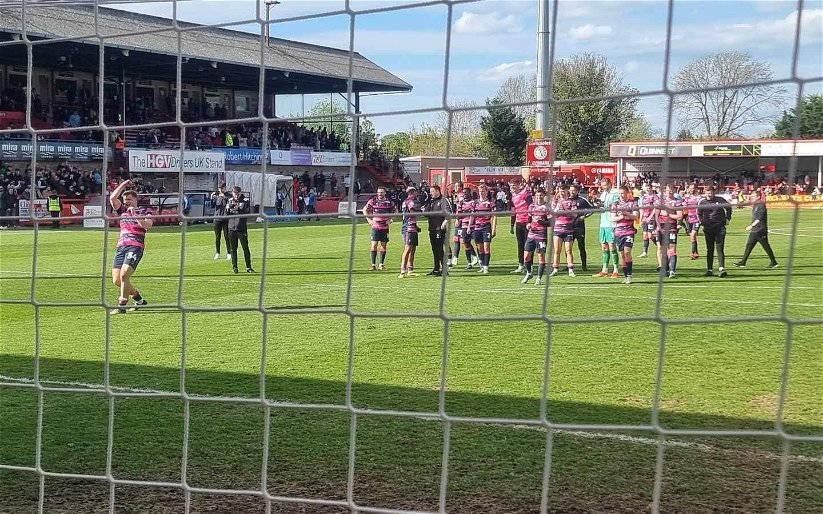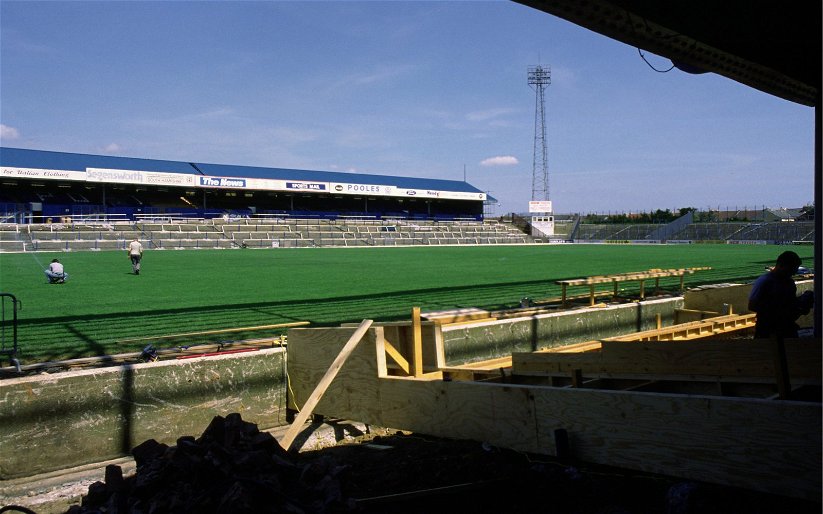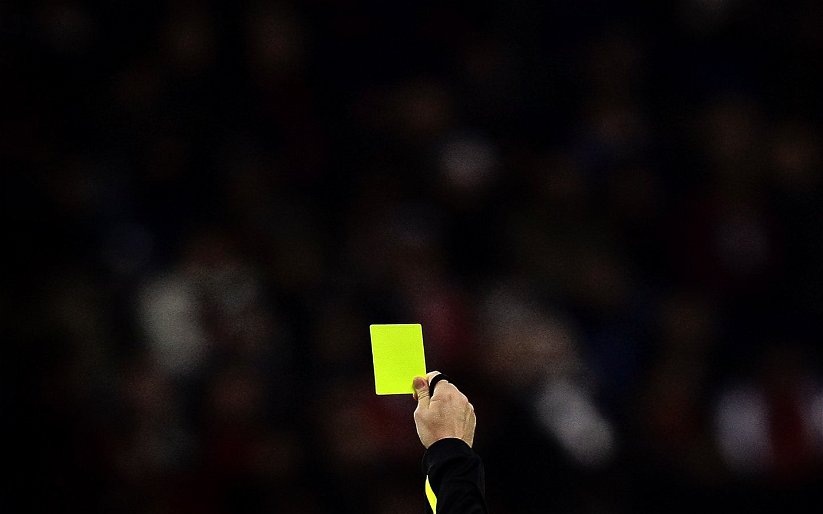Born just five miles from the football ground at which he was to make his name, tenacious midfielder Wally Downes signed for fledgling Football League club Wimbledon at the age of sixteen for £5 a week before turning professional in 1979. Enjoying the distinction of being the club’s first apprentice to progress to the Football League, Downes scored on his debut and went on to make over 200 appearances as the Dons rose from Fourth Division to First in four seasons.
However, it is often forgotten that there were two false starts in there: Wimbledon first won promotion to the Third Division in 1978-79 in their second season as a league club, but were immediately relegated in bottom place. The side re-grouped and went straight back up alongside Lincoln in 1980-81 under new manager Dave Bassett, only to be relegated again in 1981-82 despite winning six of their last eight games. The yo-yo existence continued the following season as the Dons strolled to the Fourth Division title in 1982-83 with a twenty-two game unbeaten run, but this time there was to be no return ticket. The Crazy Gang gathered spectacular momentum and went straight through the Third Division, finishing second behind champions Oxford. After a season of mid-table consolidation in 1984-85, a fantastic end of season run of sixteen games unbeaten gave Wimbledon their third promotion in four years and took them into the First Division just nine years after entering the Football League. It seems inconceivable that anything similar could happen today, but it was little more credible then.
Downes had been an integral part of that remarkable side but had suffered a series of three leg and ankle breaks, often the result of his combative style of play. Having lost his place in the side following another injury, Downes was sent on loan to struggling Fourth Division side Newport County in 1987-88 where he gained a brief reputation as a dead ball expert. His short spell at Somerton Park did nothing to prevent the Welsh side’s inexorable slide out of the Football League and out of existence shortly afterwards, but that season had another sting in its tail. Although he had achieved the rarity of playing in all four divisions – and even more unusually with the same club – Downes had recently joined former manager Dave Bassett at Sheffield United by the time Wimbledon famously beat overwhelming favourites Liverpool in the 1988 FA Cup Final. To this day, Downes remains one of only nine players to have appeared in all four divisions for the same club.
Unfortunately, Downes’ brief time at Bramall Lane was punctuated by a series of suspensions, and culminated in a broken ankle in a 1988-89 pre-season game that effectively ended his playing career.
And so commenced a thirty-year career as a coach. Encouraged to get into coaching at the age of 21 by then Wimbledon owner Ron Noades, Downes took his coaching badges at an early age. His first coaching role in earnest came at Crystal Palace (where Noades was by then chairman) as a member of Steve Coppell’s backroom team, and he remained there for twelve years in various capacities. There was a brief playing comeback, joining Isthmian League Premier Division side Hayes during the summer of 1989, but he departed in October after 15 appearances. The writing was on the wall, and Downes decided to retire completely from playing at the age of 28.
Palace went on to win promotion to the top flight on three separate occasions: 1988-89 (relegated in 1992-93), 1993-94 (relegated in 1994-95) and 1996-97 (relegated in 1997-98) – a similar sequence to the one Downes experienced as a player at Wimbledon. In addition to Coppell (three times), Downes also served under Alan Smith, Dave Bassett, Attilio Lombardo and Terry Venables before moving to Second Division Brentford as assistant manager in 2000.
The Brentford chairman at the time was none other than Ron Noades, who was also having a go at being manager. After Noades stepped down shortly afterwards, Downes then served under Ray Lewington for a few months before Lewington was replaced by a certain Steve Coppell during the summer of 2001. Reunited with old friend Coppell, Brentford finished third in the table, eventually losing 2-0 to Stoke City in the play-off final. Of equal significance was a loss of £1 million for the season, which had immediate repercussions. Having been made aware of the financial constraints he was expected to operate under, Coppell resigned on 5 June 2002. Downes was the obvious choice and was eventually appointed manager on a two-year contract on 28 June.
It was far from an ideal backdrop against which to start his managerial career. Following a number of financially challenging seasons and the collapse of ITV Digital in March 2002, Brentford were £4 million in debt and were facing the prospect of having to sell Griffin Park for a housing development. The wage bill had to be slashed and the highest wage earners were released. Only the sale of defender Darren Powell to Crystal Palace for £400,000 prevented the club from slipping into administration. Downes was forced to search for bargain basement replacements and free transfers, which did not bode well.
Against all the odds, Brentford got off to a great start, topping the table after four wins and three draws from the first seven games. Downes was named manager of the month for August, his first month in management, and the Bees looked set for a great season. However, things started to go wrong in November, and Brentford went on to win just six more games from the final twenty-nine. The run saw them finish just six points clear of relegation, although a run to the fourth round of the FA Cup was contrary to league form.
The financial position worsened steadily, and the wage bill for 2003-04 was slashed by 30%. Downes was forced to build a limited squad with free transfers and youngsters from the youth team. The season never really got going, an unbeaten run of five games in September being the highlight. Gates fell to little over 5,000 and pressure continued to build as Brentford slipped into the relegation zone. After a run of five successive defeats and just one win in eighteen games had left them second from bottom, Downes was sacked on 14 March. Only a month earlier he had been told by the Brentford board that a new contract was in the offing, but it emerged that threats by fans to cease financial contributions had brought a change of mind. Downes claimed he had done his best with one of the lowest budgets in the League, but his first experience of football management was over.
Downes was not out of work for long, joining the coaching staff at Championship side Reading. The manager there? Steve Coppell. As defensive coach, Reading had a magnificent season in 2005-06, winning promotion to the Premier League with a massive 106 points. Reading conceded just 32 goals that season, a testament to the work done by Downes specifically. The Royals managed to stay in the top flight for two seasons, being relegated in 2007-08 despite a 4-0 win at Derby on the final day. Reading made a good start to the 2008-09 season, sitting third in the Championship at the halfway stage; however, the second half of the season was not as strong and their season ended with a play-off semi-final defeat to Burnley. Coppell resigned immediately after that game, and Downes and fellow coach Kevin Dillon were also relieved of their duties shortly afterwards.
The next appointment came as first team coach at Southampton in September 2009. The manager there was Alan Pardew, whom Downes had coached at Crystal Palace. Saints had just been relegated to the third tier, and the expectation was an immediate return to the Championship. The immediate handicap was a ten-point deduction for entering administration, but the side also got away to a poor start, failing to win any of the first seven games. Southampton eventually rallied to finish seventh, seven points short of a play-off place. Shortly after the start of the 2010-11 season, Pardew and Downes were sacked apparently due to concerns over player morale.
Downes then surfaced at Gillingham as defensive coach in October 2010, but his stay was brief. The following month he was off to Premier League West Ham as defensive coach under new manager Avram Grant. The partnership was destined not to last: West Ham were relegated in bottom place and Grant was sacked. Downes kept his job under new man Sam Allardyce and West Ham made an immediate return to the Premier League with a 2-1 play-off final win over Blackpool in May 2012. Despite a relatively positive start to the 2012-13 season, Allardyce decided to make changes to his backroom team and Downes was gone. West Ham had conceded barely a goal per game during his stay; Allardyce was receiving criticism for a boring style of play at the time, so perhaps he placed the blame on his defensive coach. Who knows?
In November 2013 Downes was appointed defensive coach at QPR under Harry Redknapp on a short-term contract. As a lifelong QPR fan, it was an appointment made in heaven for Downes; however, he departed Loftus Road in July 2014 despite helping Rangers back to the Premier League. Rangers conceded less than a goal a game, but was obviously deemed surplus to requirements nonetheless.
Downes then had a period out of the game before being appointed assistant manager of Indian Super League team Kerala Blasters in 2016. The manager was a certain Steve Coppell, and the duo led Blasters to the playoffs just a year after the club had finished bottom of the table. They moved on after just a season to newly formed club Jamshedpur, created and owned by Tata Steel, for the 2017-18 season and took the new club to fifth. They moved on again for the 2018-19 season, this time to ATK, but Downes’ stay in Kolkata was destined to be even more brief.
Back in south London, trouble was brewing where AFC Wimbledon – the spiritual successors to the now-defunct Wimbledon FC – were facing relegation from League One. With an expensive new stadium about to begin construction, relegation was the last thing on the agenda. The search for a new manager was led by an old friend – Alan Pardew – and Downes was appointed to the AFC Wimbledon hot seat on 4 December 2018 on a two-and-a-half-year deal.
Downes inherited a side that was second from bottom of League One, some seven points adrift of safety after twenty matches. Things moved very slowly, and AFCW were still seven points adrift with twelve games remaining. Out of the blue, a run of five wins and five draws left the Dons needing a win at relegated Bradford on the final day to ensure survival. As it happened, a 0-0 draw proved enough to survive on goal difference, and AFC Wimbledon could breathe again.
Wally Downes is known mainly as a player and latterly a vastly experienced coach. Translating all of that to management is far from a smooth course, and many excellent coaches fail to make the transition successfully. Although he has no fewer than eleven promotions under his belt (five as a player, six as a coach), quite how good a manager he is remains to be seen, as both of his managerial positions so far have sprung from positions of adversity. The obvious assumption would be that AFCW will play a more direct form of the game, given his background as a player, but that is not the case. Although embodying the spirit of the legendary Crazy Gang, he often claims that Dave Bassett’s long-ball style was at odds with the way he wanted to play the game. He now has the opportunity to build a team in his real image.
AFC Wimbledon are due to return to the town in their new stadium in a year’s time, and Downes will be desperate to be there to lead them home. He believes that AFC Wimbledon has the same feel about it as the old Wimbledon: the question is, can lightning strike twice in south London for Wally Downes?

Key:
P = Promoted; R = Relegated; SF = Lost in play-off semi-final; F = Lost in play-off final; PO = Won play-off final; D = Demoted.
Figures are league games only; cup matches and playoffs are not included.
League position shown is either the position at the end of the season or the position at the time of departure

Writer: Scotimp
Who Are The League One Managers? No.2: Wally Downes (@AFCWimbledon):https://t.co/OL9Gh45MRd#AFCW #AFCWimbledon #SkyBetLeagueOne
— Vital Lincoln City (@VitalLincoln) July 11, 2019
https://www.facebook.com/VitalLincolnCity/posts/2291363617566537



